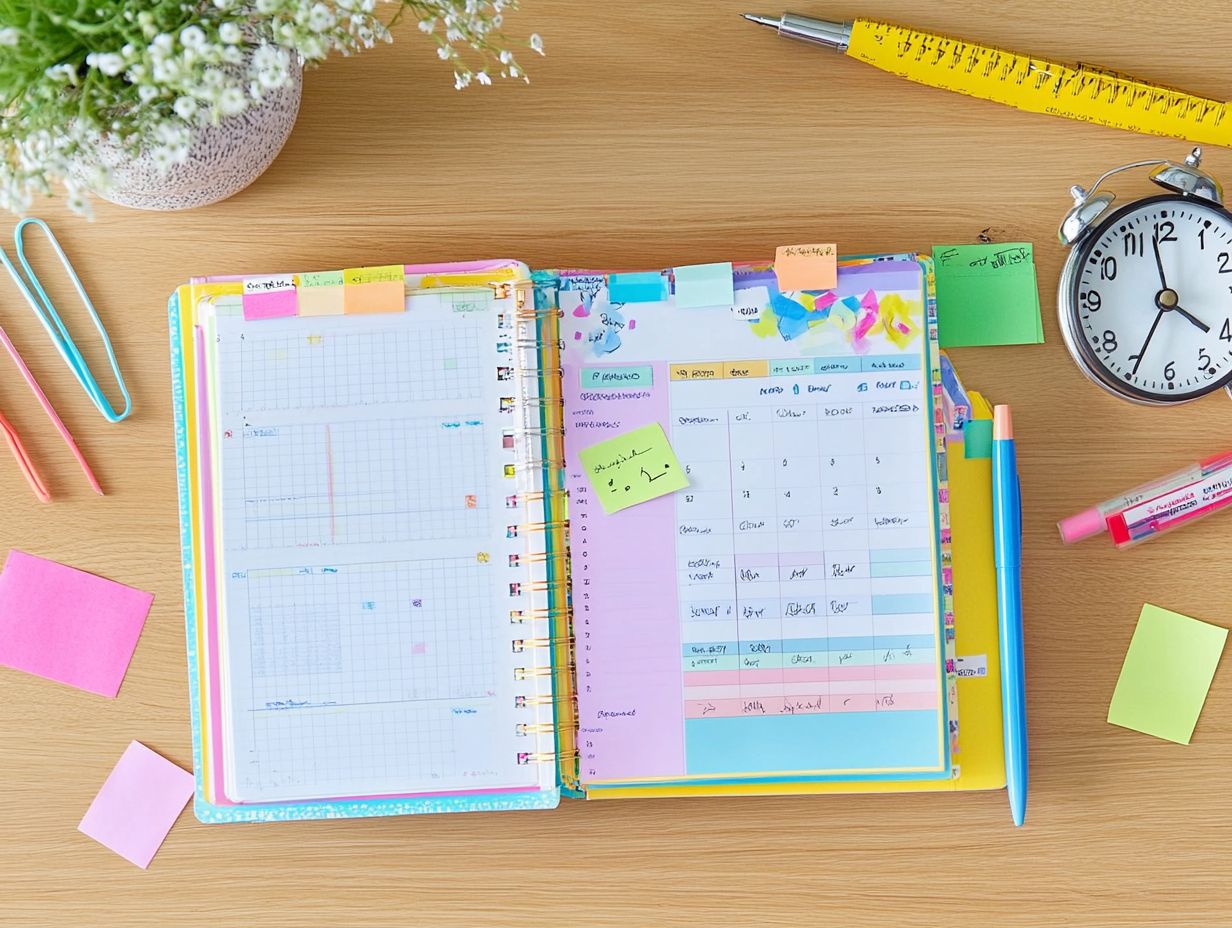10 Strategies for Better Time Management
Effective time management is crucial for boosting productivity and achieving a balanced lifestyle. With numerous distractions and responsibilities competing for attention, managing your time can feel overwhelming. This article presents ten practical strategies to help you set clear goals, prioritize tasks, and optimize your day!
You ll learn how to break projects into manageable steps, use technology to your advantage, and understand the importance of saying no. Explore how these techniques can revolutionize your daily routine and enhance your overall efficiency.
Contents
- Key Takeaways:
- 1. Set Clear and Specific Goals
- 2. Prioritize Tasks and Eliminate Time-Wasters
- 3. Break Down Big Projects into Smaller Tasks
- 4. Use Time-Blocking Techniques
- 5. Delegate Tasks When Possible
- 6. Learn to Say No
- 7. Take Breaks and Rest Regularly
- 8. Use Technology and Productivity Tools
- 9. Plan and Prepare for Each Day
- 10. Continuously Evaluate and Adjust Your Time Management Strategies
- How Can Time Management Help Improve Productivity and Efficiency?
- Frequently Asked Questions
- What Are the 10 Strategies for Better Time Management?
- How Can Setting Clear Goals Help with Time Management?
- Why Is Prioritizing Tasks Important for Time Management?
- What Is the Benefit of Creating a Schedule for Time Management?
- How Can Delegating Tasks Help with Time Management?
- How Can Practicing Self-Care Improve Time Management?
Key Takeaways:

Set clear and specific goals to direct your time and efforts efficiently.
Prioritize tasks and eliminate time-wasters to focus on what’s truly important.
Break down big projects into smaller tasks for better organization and effective time management.
1. Set Clear and Specific Goals
Setting clear and specific goals is fundamental for effective time management. This approach helps you concentrate efforts, boost productivity, and reach personal and professional milestones systematically.
When you break down your ambitions into manageable, measurable objectives, you utilize the SMART method goals that are specific, measurable, achievable, relevant, and time-bound. This structured approach clarifies tasks and promotes intentional prioritization.
Aligning daily activities with long-term goals highlights the importance of each task, enabling efficient time allocation. Techniques like creating a daily to-do list or utilizing time-blocking methods enhance focus, allowing you to make continuous progress and reduce feelings of overwhelm.
Ultimately, clearer objectives pave the way for improved task management, transforming aspirations into achievable realities.
2. Prioritize Tasks and Eliminate Time-Wasters
To manage your time effectively, prioritize your tasks and cut out pesky time-wasters. This approach allows you to focus on what truly matters, enhancing overall time efficiency.
A great method for prioritization is the Eisenhower Matrix. This handy tool helps you distinguish between urgent and important tasks, allowing better allocation of your precious time!
Many struggle with unproductive habits like procrastination, multitasking, or the constant urge to check notifications, which can easily derail your best-laid plans.
Combat distractions by setting specific time blocks dedicated solely to essential work tasks. Minimize interruptions by silencing your devices or creating a workspace that promotes focus.
Reviewing your daily goals can strengthen your commitment to tasks that advance your personal and professional objectives!
3. Break Down Big Projects into Smaller Tasks
Breaking down big projects into smaller tasks is one of the most effective strategies for managing your time. This approach helps organize tasks better and significantly reduces feelings of overwhelm.
By segmenting a large project into bite-sized pieces, you can sharpen your focus, enhance productivity, and boost your self-confidence as you check off each task. This method keeps your motivation soaring!
To streamline your workflow, group similar tasks together; this minimizes the mental shift when switching from one task to another.
Incorporating techniques like setting specific deadlines for each small task or rewarding yourself upon completion can be powerful motivators. These strategies ensure you maintain momentum throughout your project, making the entire process not just manageable but enjoyable!
4. Use Time-Blocking Techniques
Implementing time-blocking techniques in your daily schedule can enhance your productivity. By setting specific times for your tasks, you can ensure dedicated focus periods.
One effective method is the Pomodoro Technique. This approach encourages concentrated work while emphasizing the importance of regular breaks for your mental well-being.
By dividing your work into focused intervals followed by short breaks, you can maintain high levels of concentration and manage stress effectively. Tools like Google Calendar are invaluable for tracking these time blocks.
They allow you to visually map out your work periods and ensure you honor your scheduled breaks. Maintaining a balanced schedule of focused work and restorative time helps you achieve greater productivity and enhance your mental health.
Start using time-blocking today for maximum productivity!
5. Delegate Tasks When Possible
Delegating tasks is essential for mastering time management. It helps you collaborate effectively and manage your workload with ease.
This strategy not only reduces your burden but also fosters teamwork and shared responsibility. Identify which tasks you can hand off to colleagues, allowing for a more equitable distribution of work.
Collaboration can spark innovative solutions and lead to better outcomes in both your professional and personal life.
Using tools like Slack streamlines communication during the delegation process, ensuring clarity and accountability. By embracing delegation, you can focus on higher-level objectives and allow others to leverage their strengths.
Try delegating tasks today and experience the benefits of teamwork!
6. Learn to Say No

Learning to say no is a vital skill for effective time management. It helps you cultivate self-discipline and avoid the pitfalls of multitasking, which often leads to diminished productivity.
Establishing firm boundaries allows you to protect your time and focus on what truly matters. This practice sharpens your concentration and reduces the stress of overcommitment.
To decline additional tasks gracefully, consider these strategies:
- Politely explain your current commitments,
- Suggest alternative solutions,
- Recommend someone else who may assist.
Expressing appreciation in your responses can make a significant difference. Thank the requester for considering you before outlining your limitations. These techniques ensure clarity while preserving professional relationships.
Practice saying no today and protect your valuable time!
7. Take Breaks and Rest Regularly
Regular breaks are essential for maintaining mental well-being and enhancing overall productivity. They allow you to recharge and alleviate stress.
These moments don t just refresh your mind; they sharpen your focus and ignite creativity, enabling you to engage more effectively with your tasks.
The Pomodoro Technique, which encourages working in concentrated bursts followed by brief breaks, offers a strong framework for integrating these valuable rest periods.
Segmenting your work into manageable intervals helps you better manage fatigue and sustain your energy throughout longer projects.
This structured approach improves your performance on tasks and instills a habit of taking restorative breaks. Remember, efficient work is not just about effort; it’s also about intentionally including rest.
Make breaks a regular part of your routine and enhance your productivity!
8. Use Technology and Productivity Tools
Using technology and productivity tools can greatly improve your time management. They provide frameworks and resources to streamline workflows and optimize efficiency.
By integrating tools like Lucidchart for visual project mapping, you and your team can brainstorm and outline tasks collaboratively in real time. This makes it easier to visualize deadlines and dependencies.
Microsoft applications, such as Excel, are excellent for tracking time and managing budgets. They offer a straightforward method to calculate the hours spent on each task.
Atlassian platforms like Jira or Trello help you organize projects through customizable boards. This ensures clear visibility of progress.
These resources enhance collaboration and communication. They allow you to prioritize effectively and manage your workload in a structured way.
9. Plan and Prepare for Each Day
Start each day with a plan! It s a powerful way to boost your productivity and tackle important tasks.
By embracing effective planning techniques, you can maximize efficiency and alleviate feelings of overwhelm. Establishing a daily schedule provides a clear roadmap of what needs to be achieved.
Using the Eisenhower matrix, a tool that helps you decide which tasks are urgent and important, directs your focus where it’s needed most. Setting realistic deadlines fosters accountability and allows for necessary adjustments.
Together, these strategies create a more organized and less stressful approach to your daily responsibilities.
10. Continuously Evaluate and Adjust Your Time Management Strategies
Continuously evaluating and adjusting your time management strategies is crucial for boosting your efficiency right now. This process involves reflecting on techniques that have brought you success and pinpointing areas for improvement.
By regularly assessing how you spend your time, you can uncover patterns that reveal when your productivity peaks or dips, enabling you to make informed adjustments. Conducting a time audit serves as an effective approach to evaluate your tasks.
By breaking down tasks while assessing their significance, you can see how much time you allocate to each. Examining your performance metrics helps identify inefficiencies and tailor your strategies to better align with your goals.
This approach leads to better balance and productivity in your daily schedule.
How Can Time Management Help Improve Productivity and Efficiency?
Time management is essential for elevating your productivity and efficiency. It enables you to prioritize tasks, eliminate distractions, and maintain focus on achieving your goals within designated timeframes.
When mastered, this skill can transform a chaotic work environment into a harmonious operation. This ultimately leads to enhanced performance and superior results.
For example, companies like GE and NBC Universal invest significantly in training their employees to excel in time management techniques. This not only boosts productivity but also reduces workplace stress.
By adopting strategies such as effective scheduling and utilizing project management tools, these organizations foster a culture that promotes healthy work habits. As a result, employees feel more accomplished and motivated, contributing positively to the overall success of the company.
What Are the Common Time Management Mistakes to Avoid?

Being aware of common time management mistakes is crucial for improving your method and steering clear of unproductive habits that could hinder your progress.
You may find yourself falling into traps like poor task prioritization. Urgent tasks can overshadow those that truly matter, creating a cycle of stress and inefficiency.
Neglecting break times can also disrupt your focus and energy levels. This makes it increasingly challenging to maintain productivity over the long haul.
The inclination to multitask might seem appealing, but it often diminishes your overall effectiveness.
To combat these pitfalls, consider employing strategies like the Eisenhower Matrix a tool that helps you prioritize tasks based on urgency and importance. Also, schedule regular breaks to recharge and focus on one task at a time.
These adjustments can significantly enhance your time management skills. By embracing these practices, you streamline your workflow and cultivate a healthier work-life balance.
How Can Time Management Help with Work-Life Balance?
Good time management helps you find a better work-life balance. It enables you to allocate time for both work and personal interests without feeling overwhelmed by tasks.
Using time management strategies lowers stress and boosts mental well-being. When you clearly define your priorities and thoughtfully craft your schedules, tasks are less likely to encroach on your personal time.
Incorporating breaks and relaxation periods into your daily routine enhances productivity while allowing you to prioritize your mental health.
Scheduling personal time be it a morning yoga session or an evening stroll creates vital space for self-care.
Take a moment to disconnect from work! It will rejuvenate your mind and body, leading to a more balanced and fulfilling life.
What Are the Benefits of Time Management in the Long Run?
The long-term benefits of effective time management go far beyond a mere boost in productivity. They play a crucial role in achieving professional success and personal satisfaction.
By honing this essential skill, you position yourself to organize tasks more effectively. This enhances your efficiency and boosts your self-confidence.
As your organizational abilities improve, you ll find that managing deadlines becomes much easier! This creates space for your creativity and strategic thinking to flourish.
As you refine your time management practices, you’ll discover the potential to set and achieve long-term goals. This opens doors to valuable opportunities in the workplace.
This mastery can lead to promotions, increased responsibilities, or even the courage to explore new career paths. Ultimately, it crafts a more fulfilling professional journey for yourself.
How Can Time Management Help with Stress Management?
Stress gets to everyone. Luckily, time management can help! It is an invaluable asset in your toolkit for stress management, enabling you to prioritize, organize, and handle your workload with finesse.
By adopting effective time management strategies, you can significantly diminish feelings of overwhelm and anxiety. This cultivates a more tranquil mental space.
Techniques like conducting regular time audits allow you to evaluate how you’re spending your time. You can then make necessary adjustments to enhance productivity.
Setting realistic expectations is crucial to sidestepping the traps of overcommitment, which often lead to unnecessary stress.
These practices instill a sense of control over your daily tasks, enabling a smoother workflow and promoting overall mental well-being.
Ultimately, mastering the art of time management not only boosts your efficiency but also fosters a healthier mindset.
What Are Some Realistic Time Management Strategies for Busy Individuals?
For busy individuals, effective time management is crucial. These strategies help you make the most of your limited time.
One effective technique is the Pomodoro Technique. It enhances focus by breaking work into manageable intervals with regular breaks.
Automating repetitive tasks can also save you precious time, leading to a more streamlined workflow.
Prioritization is key. The 80/20 rule states that 80% of your results come from 20% of your efforts, allowing you to focus on what truly matters.
This approach maximizes productivity and reduces feelings of overwhelm, enabling you to tackle daily tasks with confidence and clarity.
Frequently Asked Questions
What Are the 10 Strategies for Better Time Management?

The 10 strategies for better time management include: setting clear goals, prioritizing tasks, creating a schedule, eliminating distractions, delegating tasks, taking breaks, practicing self-care, using technology, avoiding procrastination, and reviewing your plan.
How Can Setting Clear Goals Help with Time Management?
Clear goals provide direction and purpose for your tasks. This helps you avoid wasting time on unimportant activities.
Why Is Prioritizing Tasks Important for Time Management?
Prioritizing ensures that you focus on the most urgent and important tasks. This way, your energy goes towards activities that yield the greatest results.
What Is the Benefit of Creating a Schedule for Time Management?
A schedule gives you a clear plan for your day or week. It helps you stay on track and make the most of your time.
How Can Delegating Tasks Help with Time Management?
Delegating allows you to save time and focus on what truly matters. It reduces your workload and frees up mental space.
How Can Practicing Self-Care Improve Time Management?
Self-care, like getting enough rest and exercise, boosts your energy levels. This leads to better productivity and effective time management.






